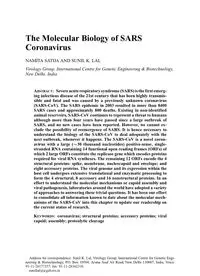
2007 The Molecular Biology of SARS Coronavirus PDF
Preview 2007 The Molecular Biology of SARS Coronavirus
The Molecular Biology of SARS Coronavirus NAMITA SATIJA AND SUNIL K. LAL Virology Group, International Centre for Genetic Engineering & Biotechnology, New Delhi, India ABSTRACT: Severeacuterespiratorysyndrome(SARS)isthefirstemerg- ing infectious disease of the 21st century that has been highly transmis- sible and fatal and was caused by a previously unknown coronavirus (SARS-CoV). The SARS epidemic in 2003 resulted in more than 8400 SARS cases and approximately 800 deaths. Existing in non-identified animal reservoirs, SARS-CoV continues to represent a threat to humans although more than four years have passed since a large outbreak of SARS, and no new cases have been reported. However, we cannot ex- clude the possibility of reemergence of SARS. It is hence necessary to understand the biology of the SARS-CoV to deal adequately with the next outbreak, whenever it happens. The SARS-CoV is a novel coron- avirus with a large (∼30 thousand nucleotides) positive-sense, single- stranded RNA containing 14 functional open reading frames (ORFs) of which 2 large ORFs constitute the replicase gene which encodes proteins required for viral RNA syntheses. The remaining 12 ORFs encode the 4 structural proteins: spike, membrane, nucleocapsid and envelope; and eight accessory proteins. The viral genome and its expression within the host cell undergoes extensive translational and enzymatic processing to form the 4 structural, 8 accessory and 16 nonstructural proteins. In an effort to understand the molecular mechanisms or capsid assembly and viral pathogenesis, laboratories around the world have adopted a variety of approaches to answering these trivial questions. It has been our effort to consolidate all information known to date about the molecular mech- anisms of the SARS-CoV into this chapter to update our readership on the current status of research. KEYWORDS: coronavirus; structural proteins; accessory proteins; viral capsid; assembly; proteolytic cleavage Address for correspondence: Sunil K. Lal, Virology Group, International Centre for Genetic Engi- neering & Biotechnology, P.O. Box 10504, Aruna Asaf Ali Road, New Delhi 110067, India. Voice: 91-11-26177357; fax: 91-11-26162316.
